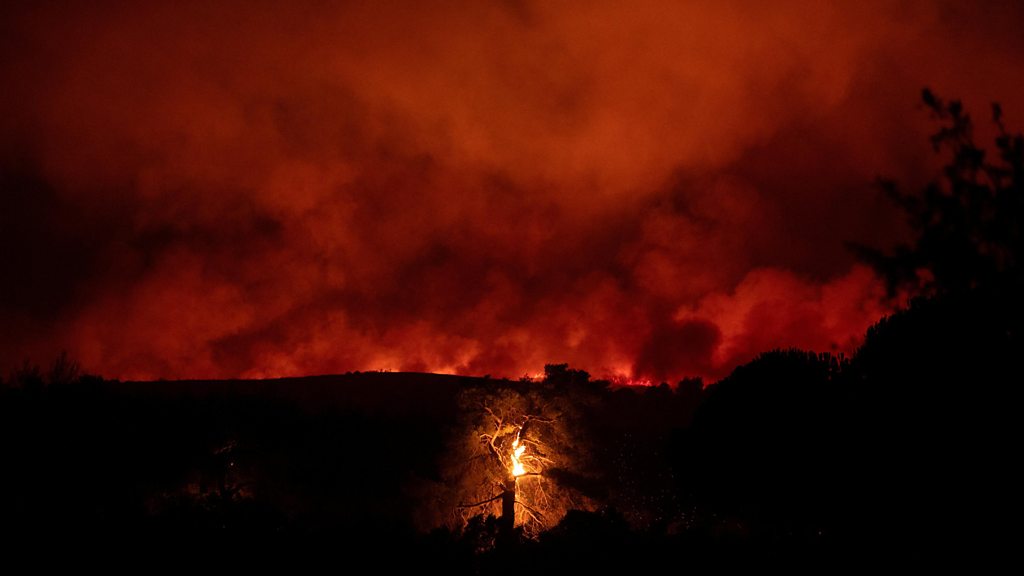Fresh evacuation alert as Greek wildfire threat continues
On Tuesday, a new evacuation alert was issued for the Greek seaside town of Nea Makri as severe wildfires continued to impact the suburbs of Athens.
A fire service source informed the BBC that one person, believed to be a woman, was found dead inside a shop in Vrilissia, northern Athens.
Thousands have been evacuated after firefighters warned that homes, businesses, and schools were at risk.
While the massive smoke cloud over Athens cleared by Tuesday morning, the air remained hazy. Helicopters, grounded overnight for safety, were once again patrolling the skies.
Residents in parts of Athens not directly affected by the fire reported finding ash on their balconies.
Firefighters, who described themselves as “exhausted,” are now concentrating on hotspots rather than a single major firefront. Fire service spokesman Col. Vassilios Vathrakogiannis noted that although there is no longer a single active fire front in the northeastern Attica region, which includes parts of Athens, there are still “many active localized blazes,” particularly around the towns of Marathon and Penteli.
Conditions for new fires remain dangerous not only on Tuesday but also further into the week, he said in a statement released on Monday evening.
More than 700 firefighters, 199 fire engines, and 35 waterbombing aircraft have been involved in efforts to extinguish the fires, which first broke out on Sunday afternoon around 35km (22 miles) north of the Greek capital.
Col Vathrakogiannis said two firefighters had received treatment for burns while fighting the blazes.
Officials said fires broke out in 40 different locations on Monday and that some areas saw flames as high as 25m (82ft).
In unprecedented scenes, people in Athens wore facemasks to protect themselves from the smoke, which blew into the city.
Greece’s National Observatory said on Monday evening that satellite images showed that, by noon local time (10:00 BST), the fire had already affected around 100,000 acres (405 sq km; 156 sq miles) of land.
In Penteli, a wooded, hilly region, three hospitals had to be evacuated, and one of the sites of the National Observatory was at one stage feared to be under threat.
The blaze also engulfed a timber factory, and elsewhere in the area, several explosions were heard, most likely from fuel tanks and residential gas cylinders.
Despite the danger, some Penteli residents chose to stay near their homes and tried to put out pockets of fire using hoses or tree branches.
“It hurts. We have grown up in the forest. We feel great sadness and anger,” 24-year-old resident Marina Kalogerakou told Reuters news agency as she poured water from a bucket onto a burning tree stump.
Pantelis Kyriazis, another resident, crashed his car as he tried to leave.
“I couldn’t see. I hit a pine tree and this is what happened,” he said, gesturing towards the car.
Further north, near the epicenter of the fire, 81-year-old Vassilis Stroubelis stood in the doorway of his damaged home.
“Thirty years I was building all this. Thirty years and bam,” he said.
European nations have announced assistance for Greece after its government activated the EU’s mutual civil protection mechanism.
Italy is providing two planes while France and Serbia are providing one helicopter each, Col Vathrakogiannis said.
Spain, the Czech Republic, and Romania are sending further vehicles, personnel, and aid.
Neighboring Turkey is also preparing to send two planes and a helicopter, Foreign Minister Öncü Keçeli said.
Writing on X, formerly Twitter, European Commission President Ursula von der Leyen said the EU would “stand with Greece as it battles devastating fires”.
Greece has just experienced its hottest June and July on record.
Climate change increases the risk of the hot, dry weather that is likely to fuel wildfires.
The world has already warmed by about 1.1C since the industrial era began and temperatures will keep rising unless governments around the world make steep cuts to emissions.


